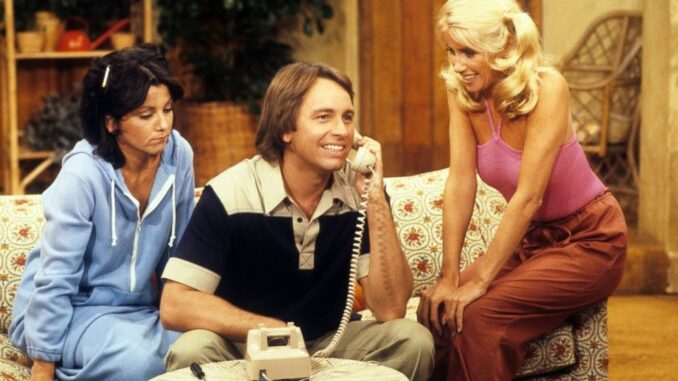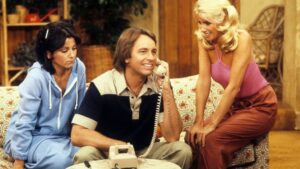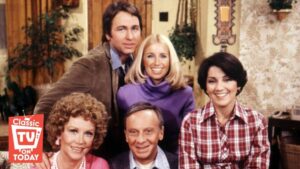
If you remember TV in the mid-1970s, you’ll no doubt recall it was the era of “jiggle TV,” where scripts were thinly-veiled excuses for Lynda Carter’s Wonder Woman to run in slow motion, Charlie’s Angels often solving crime in bikinis and the “hers and hers and his” set-up of Three’s Company that ran from 1977 to 1984. The latter has been on the minds of many recently, with mixed feelings when reflecting on the Three’s Company cast, smiles accompanied by a sense of sadness over the loss of John Ritter two decades ago and, much more recently, the heartbreaking death of Suzanne Somers.
The premise of the show is so simple — two women and a guy share an apartment, with the guy having to pretend that he’s gay to get away with the living situation from his far-more-conservative landlord and his landlord’s wife. And yet, there was comic gold there with slapstick humor, misunderstandings and lots of sexual innuendo.

“People initially may have tuned in for the titillation, but they kept knocking on the trio’s door for the laughs,” says Chris Mann, author of the definitive book on the series, Come and Knock on Our Door: A Hers and Hers and His Guide to Three’s Company. “The show’s zany format was a welcome departure from life’s stresses. It was a great escape with friends who were each others’ — and our — extended family. The same holds true today, but now we get a super-nostalgic blast to the past that helps us deal with present-day anxieties. And the fact that it stars beloved actors and comedy icons is the cherry on top. It’s a feel-good trip to a place where problems are just misunderstandings solved with wacky pratfalls, hijinks, and hugs.”
Three’s Company cast before, during, and after the show
An up-close look follows at those beloved actors and comedy icons.
John Ritter as Jack Tripper
In some ways, it’s still difficult to believe that John Ritter passed away 20 years ago at the age of 54, yet thanks to his work in television and film — especially as part of the Three’s Company cast — his memory endures.
“John could have let being the show’s top-billed star — and, as a natural farceur and brilliant physical comedian, his producer’s favorite — go to his head,” muses Mann. “Instead, he set the tone and example for a fun-loving, low-drama set. When tensions arose, he’d fall over the couch or do another bit to crack everyone up and bring levity back into the workspace. He saw Joyce as TV’s most talented physical comedienne next to Lucille Ball, and he especially loved working with Suzanne, who made him laugh. And he loved his co-stars. All of them. He knew they had something special. Despite stresses behind the scenes, he turned down doing a Jack Tripper-centered spin-off numerous times as early as the show’s third season and through the seventh. His sensitivity and goofiness as John and Jack made him so endearing and helped create a much-needed antidote to the ’70s-’80s macho male.”
He was born Jonathan Southworth Ritter on September 17, 1948 in Burbank, California, and came to performing honestly: his father, Tex Ritter, was an early pioneer of country music and took to performing on the radio and stage. But initially John actually studied psychology at the University of Southern California, deciding to make the shift to theatre arts. He transferred over to the USC School of Dramatic Arts, graduating in 1973 and thought he’d follow a stage career, but, instead, found himself guest starring on such episodic television shows as M*A*S*H, The Bob Newhart Show, The Mary Tyler Moore Show and, especially, The Waltons, on which he would appear 18 times in the role of Reverend Matthew Fordwick.
Mann points out that while the actor “had great versatility and could play dramatic roles, it really was the MTM comedies that tilted him into primarily a sitcom star.”

Three’s Company arrived in 1977. “The show was called Three’s Company, but it might as well have been called The John Ritter Show,” says Richard Kline, who played Jack’s best friend, Larry Dallas, “because he drove the physical comedy and the relationship comedy. He was the star of that show no matter how many blondes came and went.”
John himself did an interview in which he admitted that although he loved the series, he was nonetheless embarrassed to say so — though that changed when comedy legend Lucille Ball sang her praises for the show and of Ritter.
During and after the show, Ritter appeared in a number of films, but it was really television that the actor called home, starring in the Three’s Company spin-off, Three’s a Crowd (1984 to 1985), Hooperman (1987 to 1989), Hearts Afire (1992 to 1995) and 8 Simple Rules … For Dating My Teenage Daughter (2002 to 2005). Sadly, that would be his final sitcom as during rehearsal for an episode on September 11, 2003, he collapsed, dying later that night from a previously undiagnosed congenital heart defect, which resulted in aortic dissection.
In his personal life, he was married to actress Nancy Morgan from 1977 until their divorce in 1996, and actress Amy Yasbeck from 1999 until his death. He’s the father of four, including actor Jason Ritter.
Strangely enough, Marty Davidson, who directed Ritter in the 1980 superhero comedy Hero at Large, says the memory of the actor’s funeral still stands out to him. Following the tributes paid to his memory, the back doors of the movie theatre the wake had been held in burst open and a hundred-piece marching band from USC, dressed in full regalia, got about 200 people on their feet and marching out onto Hollywood Boulevard and into a nearby bowling alley for food, drinks and celebration. “It was an amazing experience,” he laughs, “because even when John passed away in such a sad way, we were all still overwhelmingly moved and laughing and having fun.”
Joyce DeWitt as Janet Wood
Chris Mann describes Joyce as being the most serious of the three original roomies in the Three’s Company cast. “As a longtime theatre actress and director,” he explains, “she was committed to making the characters and their relationships as three-dimensional as possible within the, at times, T&A-showcasing, sitcom farce format. So, despite being a naturally shy and soft-spoken person, she stood her ground when she felt the producers were writing jokes at the expense of what she calls character truth. That, coupled with one of the producers calling their showrunning style a ‘benevolent dictatorship,’ led to some serious creative disagreements. But she made Janet Wood — originally conceived as a heavy-handed character who emasculated Jack Tripper and was cast as sort of the Jane Russell to Suzanne’s Marilyn Monroe — the perfect, lovable longtime farce partner to Jack.”
